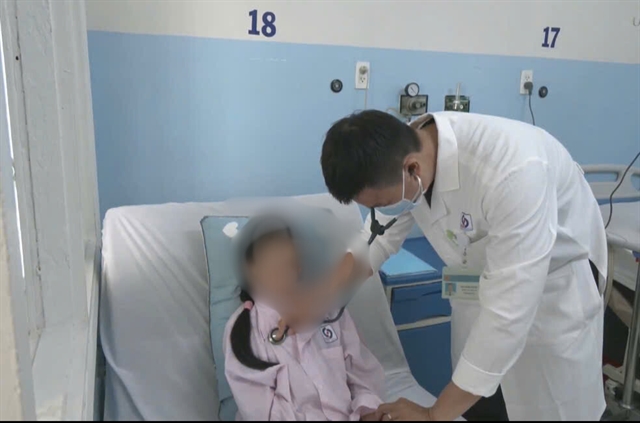 Society
Society

 |
| A doctor performs a health check-up on patient Đ.T.M.L. — VNA/VNS Photo |
HÀ NỘI — Doctors at Gia Định People's Hospital in HCM City have successfully saved a woman who was critically infected with Burkholderia pseudomallei, the bacteria responsible for Whitmore's disease, often referred to as the 'flesh-eating' bacteria.
The patient, identified as Đ.T.M.L, is a 33-year-old resident of Gò Vấp District in HCM City. She initially sought medical attention for a high fever at a local clinic. However, her condition rapidly deteriorated and within three days, she developed respiratory failure.
She was then rushed to Gia Định People's Hospital, where she was diagnosed with acute respiratory failure caused by severe pneumonia, with 70 per cent of her lung tissue damaged.
Doctors immediately placed her on extracorporeal membrane oxygenation (VV-ECMO), a life-saving procedure. Tests confirmed that she was infected with Burkholderia pseudomallei, a soil-dwelling bacterium.
Thanks to prompt and targeted treatment, her condition improved after four days. She was removed from the ventilator after seven days and made an almost complete recovery within two weeks.
The patient later revealed that she frequently walked barefoot in parks as part of her exercise routine, a habit she believes may have led to the infection.
Phó Thiên Phước, a specialist at Gia Định People's Hospital, noted that Burkholderia pseudomallei is commonly found in tropical regions, including Southeast Asia and Northern Australia.
The bacteria thrive in contaminated soil and water and pose a significant risk to individuals with weakened immune systems, such as those with diabetes or chronic kidney disease.
Recent statistics from countries like Thailand and Singapore show alarming mortality rates of up to 50 per cent for sepsis cases caused by this pathogen. For patients with severe pneumonia, the mortality rate can reach as high as 75 per cent.
Phước emphasised that early diagnosis and immediate, aggressive treatment are essential for improving survival chances.
“Quick intervention helps avoid the need for costly resuscitation methods,” he said.
According to Đỗ Duy Cường, Director of the Tropical Disease Centre at Bạch Mai Hospital, early detection through proper diagnostics is key to reducing fatality rates.
He advises people to avoid direct contact with contaminated soil or water, especially if they have open wounds. Those working in agriculture are also encouraged to wear protective gear to minimise the risk of infection.
He also stressed the importance of protecting healthcare workers from exposure during patient care.
While there is no vaccine for Whitmore, timely and accurate treatment can lead to recovery. However, the disease still carries a high mortality rate of up to 40 per cent, even with medical intervention.
As Whitmore cases continue to surface, health officials are urging the public to be vigilant, especially those with underlying health conditions such as diabetes, which significantly increases the risk of severe complications. — VNS




